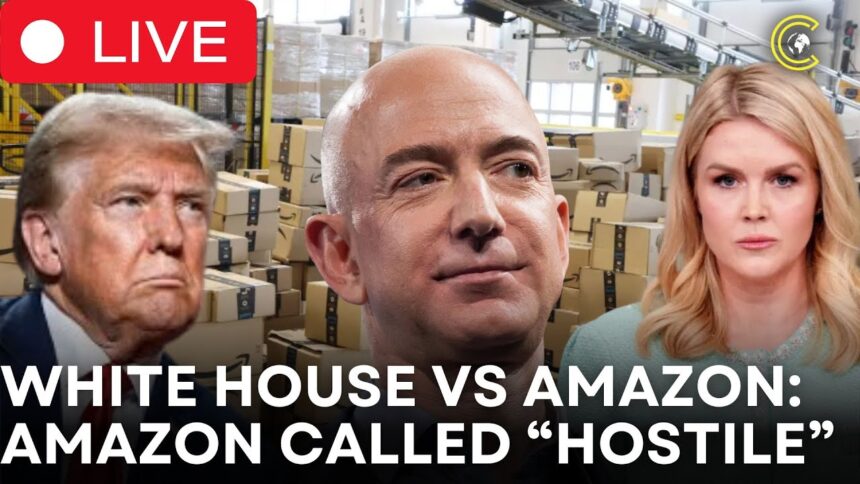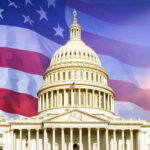Amazon tariff costs have now thrown themselves right into a swelling controversy that connects a White House criticism, the Trump tariffs, and, of course, the U.S.-China trade war. An unconfirmed story claimed the budget side of Amazon-Haul-was to contemplate showing the Amazon tariff costs on product pages. Although Amazon denied any plans to implement such a change on its main site, the rumors were enough to set off market reactions, political condemnation, and hot public debates.
The very idea of merchandising Amazon tariff costs put alarm bells into a Trump administration giddy with a new wave of Trump tariffs in retaliation for Chinese goods. To this, the White House criticism responded with an immediate wave of disapproval, accusing Amazon tariff costs of the move being politically motivated instead of a service to the customer.
Also Read: Amazon vs Starlink: Kuiper Internet Satellites Spark New Satellite Internet War!
White House Criticism and Trump’s Direct Involvement
The White House criticism came swiftly after the Punchbowl News report. The Press Secretary, Karoline Leavitt, condemned the action, calling it a “hostile and political act” by Amazon. Why the e-commerce giant had not undertaken a similar effort at transparency during the peak inflation under Biden was Ms. Leavitt’s question. The implied message here was that showing Amazon tariff costs could be construed as a direct challenge to Trump tariffs.
Then President Trump personally called Amazon chairman Jeff Bezos. Sources say Trump was unhappy about Amazon’s visible move and that publicly showing Amazon tariff costs would hurt his administration’s narrative on trade. Later Trump said that Bezos had quickly “solved the problem,” which meant Amazon’s reversal of the rumored plan was politically wise.
These White House criticisms indicate much larger tensions that exist between politics and the tech giants, especially during an atmosphere as volatile as the one created by the U.S.-China trade war. This sensitivity surrounding Trump’s tariffs and Amazon’s response show how political companies are becoming in global trade dynamics.
Amazon Haul and the Internal Discussions
Rumors were swirling regarding Amazon Haul, a discount platform that has been introduced with the intention of competing against cheap online retailers like Shein and Temu. It was further reported that there had been internal discussions around displaying Amazon tariff costs for select products, particularly high Trump’s tariffs for those products imported from China, at Amazon Haul.
While the idea was meant to be geared towards promoting consumer trust with transparency, the political ramifications quickly overshadowed everything else. Responding to the backlash that followed, an Amazon spokesperson explained, the Amazon tariff costs feature was never approved for the main Amazon site. Hypothetical discussions were what occurred inside Amazon Haul.
Such internal discussion is common at Amazon, but the company hasn’t any scruples of popularizing its audiences for ‘Amazon tariff costs‘ in public. Customer experience on the primary platform will remain unchanged, as the retail giant reiterated. There currently are no confirmed plans regarding exposure to Trump tariffs or other import changes through product listings.
Also Read: Trump Car Tariffs: How America’s Auto Industry is Bracing for Impact in a Globalized World
Tariff Tensions in the Ongoing U.S.-China Trade War
The larger issue is the expanding U.S.-China trade war, which has been aggravated by newly imposed tariffs under Trump—some as high as 145% on selected goods. In retaliation, China slapped 25% tariffs on certain American products. Such tit-for-tat retaliatory measures have always been used by both countries to impose their economic will.
Amazon Tariff costs are mounting for retailers like Amazon, who are heavily dependent on products from China. While Amazon hasn’t charged users publicly for these costs, the pressure to raise prices is certainly real. Many industry experts project a sharp rise in pricing for a lot of the products on the platform due to these Trump tariffs.
The question of whether to reveal Amazon tariff costs to customers in turn reflects a larger issue; should companies more frequently communicate revenue costs imposed by the government, regardless of whether such disclosures would invite significant political backlash? In an atmosphere heavy with political commentary, the fine line separating transparency from partisanship will, therefore, be blurred.
Investor Reaction and the Road Ahead
The 2% dip in Amazon stock after the news broke surely testified to investor fears regarding the implications of revealing Amazon tariff costs. Analysts were concerned that this might have been interpreted as a protest against Trump tariffs and, hence, could bring the wrath of some regulatory retaliation or a consumer backlash from conservative shoppers.
On the other hand, when the company denied the rumor adamantly, a small rebound in shares was noticed, but it remained a hot topic in all financial and political media. The White House criticism may have kept mum for now, but if tariffs keep looming over consumer prices, all bets are off.
Probably, each step in such cases now warrants extreme caution since, given the scheming Amazon project one has in sight, the U.S.-China trade war could advance, with Trump tariffs cropping into global trade discussions. The internal discussions at Amazon Haul also show that firms are starting to pin down how much of the losses they can absorb, but they also show the dangers that vis-a-vis that kind of political environment.
So it will not list Amazon tariff costs for now, but the whole debate on corporate accountability during economic wars is by no means over.
For More Trending Business News, Follow Us 10xtimes News






